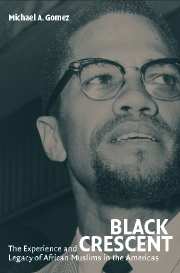6 - Breaking Away – Noble Drew Ali and the Foundations of Contemporary Islam in African America
Published online by Cambridge University Press: 05 June 2012
Summary
In addition to religious practice and racial composition, Ishmaelite distinctiveness was marked by the fact that their gradual south-to-north trek was stimulated by interests other than industrialization and wage labor. By the early twentieth century, they constituted a collective anachronism, rapidly losing ground to an enveloping urbanization, a people literally and figuratively out of place and time. In contrast, the leader of the successor movement to the Ishmaelites, inheriting the mantle of “Islamism” from them and in fact providing asylum for the ragtag remnant of Ishmaelite survivors in the early twentieth century, was a man initially drawn to the North for economic reasons, and as such served as forerunner to a subsequent, massive relocation of black folk from the South. Noble Drew Ali, as he came to be known, would negotiate a complex set of circumstances in the North, resulting in the creation of a novel ideology and worldview, a metaphysical enunciation that would serve as the essential point of connection between what had been and what was going to be. For, in the final analysis, Noble Drew Ali is necessarily the bridge over which the Muslim legacies of the eighteenth and nineteenth centuries crossed over into the Muslim communities of the twentieth and twenty-first. As his efforts and formulations serve as the foundation for the myriad expressions of Islam among contemporary African Americans, he must be acknowledged as the master builder, a turn of phrase consistent with the multiple interpretive dimensions of such a movement, as will be demonstrated shortly.
- Type
- Chapter
- Information
- Black CrescentThe Experience and Legacy of African Muslims in the Americas, pp. 203 - 275Publisher: Cambridge University PressPrint publication year: 2005



